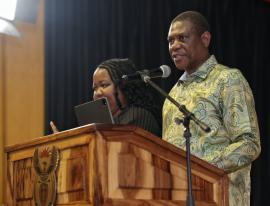
While the rise of the digital economy and use of technology have introduced new avenues for perpetrators to harm and abuse women and children, Deputy President Paul Mashatile says the same technology can be used as a tool for change, protection and empowerment.
Speaking at the national launch of 16 Days of Activism for No Violence Against Women and Children campaign, in Rustenberg in the North West on Monday, the Deputy President called for further collaboration to harness technology and innovation to combat gender-based violence (GBVF) and accelerate a gender-inclusive digital economy.
He called for zero tolerance toward gendered violence in online and digital spaces, noting that the increase in the use of technology in peoples’ daily lives has introduced new avenues for perpetrators to harm, exploit, and abuse women and children.
The Deputy President said digital spaces can become breeding grounds for violence, from cyberbullying and online harassment to the dangers posed by social media platforms.
However, citizens can also harness the same technology as a tool for change, protection and empowerment.
“From using mobile apps that provide immediate support to victims and survivors to artificial intelligence that can help us understand and curb the pandemic, the potential is vast. Mobile apps, [including] helplines, and emergency response systems provide a direct link to safety, offering quick access to shelters, medical care and legal assistance.
“In South Africa, initiatives such as the GBV Command Centre - a 24/7 digital and telephonic support service - have proven instrumental in helping victims and survivors. We must leverage these advancements to enhance our prevention strategies, improve our response mechanisms, and ensure that no one is left behind,” he said.
The Deputy President said the internet should be used as a place where everyone can feel safe and respected.
“Access to technology and digital skills can open new economic opportunities, enabling financial independence and resilience. As we embark on these 16 Days of Activism for no Violence Against Women and Children, let us harness the power of technology and innovation to drive systemic change.
“Let us not forget that technology can be a force for good. It has the potential to save lives, connect victims and survivors to support, and hold perpetrators accountable in ways that were previously unimaginable,” Deput President Mashatile said.
Observed annually from 25 November to 10 December, the 16 Days of Activism campaign calls upon every individual to take a stand against the injustices that continue to plague society.
During the campaign period, the country raises voices to draw attention to the persistent violence against women and children.
The Deputy President said a full year of action is required to combat the scourge, not just during these 16 days.
This year's campaign, observed under the theme: “30 Years of Advancing Collective Action to End Violence Against Women and Children”, serves as a reminder of the progress made by the country and the work that still lies ahead.
The Deputy President acknowledged that society has for many years been grappling with the issue of gender-based violence and femicide, which includes the high rate of rape, femicide, and domestic abuse, and the fight is still not over.
Both Statistics South Africa (StatsSA) and the Human Science and Research Council (HSRC) have reported concerning statistics on GBV in South Africa.
StatsSA has revealed that one in three women aged 16 and older has experienced physical violence, while one in five has been sexually abused.
The first-ever national Gender-Based Violence survey conducted by HSRC in 2022, also revealed that over 33% of South African women have experienced physical violence in their lifetime, while 9.8% have faced sexual violence. The study showed that approximately 7.3 million women have experienced physical abuse, while 2.1 million have experienced sexual violations.
Mashatile said government was committed to taking the findings of the surveys seriously and would integrate them into the work of government.
He said the findings will feed directly into the National Strategic Plan on Gender-Based Violence and Femicide (NSP on GBVF), which provides the roadmap for government's national response. – SAnews.gov.za


